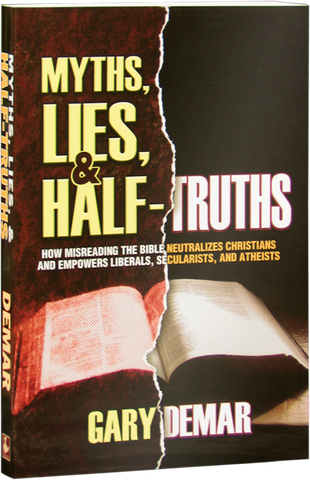Gary discusses the recent advice by Alistair Begg about Christians attending gay “weddings.”
If the writers of Scripture, as instruments of God’s will (2 Tim. 3:16–17), did not think it improper to discuss political issues, then how can ministers who claim allegiance to an inspired and infallible Bible fail to address politics and every other issue discussed in Scripture? The entire created order is open to discovery, study, and discussion.
Paul repeats the commandments prohibiting adultery, murder, and theft (Rom. 13:9) and sums up his specific exhortation on the law with the general command to “love your neighbor as yourself” (13:9). These instructions came after Paul informs the Roman Christians that the civil magistrate is a “minister of God” (13:4) who is to make a determination between good and evil behavior (13:3). What standard should the magistrate (God’s civil minister) use to make these judgments?
These commandments have multiple social applications. Certainly the civil magistrate is to find it his duty to love his neighbor by not burdening him with excessive taxation and bureaucratic entanglements to frustrate his God-endowed freedoms to earn a living and provide for his family. No doubt the magistrate is to work for a civil order that results in a “tranquil and quiet life in all godliness and dignity” (1 Tim. 2:2) for the people of God. In the first-century, all that these Christians could do was appeal to God with “entreaties and prayers, petitions and thanksgivings” since they had no freedom to petition the Roman Empire with their political wishes (1 Tim. 2:1).
It seems by all of this that Paul went beyond what many might think is “just preaching the gospel.” You can find similar emphases in all the New Testament letters as well as in the ministry of Jesus. Redemption from sin, the new birth, is the first step in what it means to be a “new creature” in Christ (2 Cor. 5:17). These first steps are described by the writer to the Hebrews as “elementary principles of the oracles of God” (Heb. 5:12), the milk stage of growth (1 Peter 2:2). The time must come when the student matures to become a teacher (Heb. 5:12). The goal is to grow in Christ: “For every one who partakes of milk is not accustomed to the word of righteousness, for he is a babe. But solid food is for the mature, who because of practice have their senses trained to discern good and evil” (5:13–14). The “only-preach-the-gospel” mentality stunts the growth of the new convert. The writer to the Hebrews is adamant about development in the faith, so much so that he offers the following admonition to his readers: “Therefore leaving the elementary teaching about the Christ, let us press on to maturity, not laying again a foundation of repentance from dead works and of faith in God” (6:1).

Myths, Lies, and Half-Truths
Too many Christians believe that the Bible is irrelevant this side of heaven. While the homosexual community, which makes up about 1% of our population, exercises tremendous impact on our culture and laws, Christians, who make up about 35% of the population, have voluntarily abandoned the culture war, electing to hide the gospel under a bushel instead. Our nation is in a crisis. The world is crying out for answers in the face of bewildering and seemingly unsolvable problems. Myths, Lies, and Half-Truths shows that the Bible has real answers to these problems -- answers the church is currently ignoring.
Buy NowGary discusses the recent advice by Alistair Begg about Christians attending gay “weddings.” There is much more behind Pastor Begg’s advice, and anyone who was paying attention wouldn’t be very surprised. Carl Trueman also weighed in on the issue with an excellent article on First Things.

